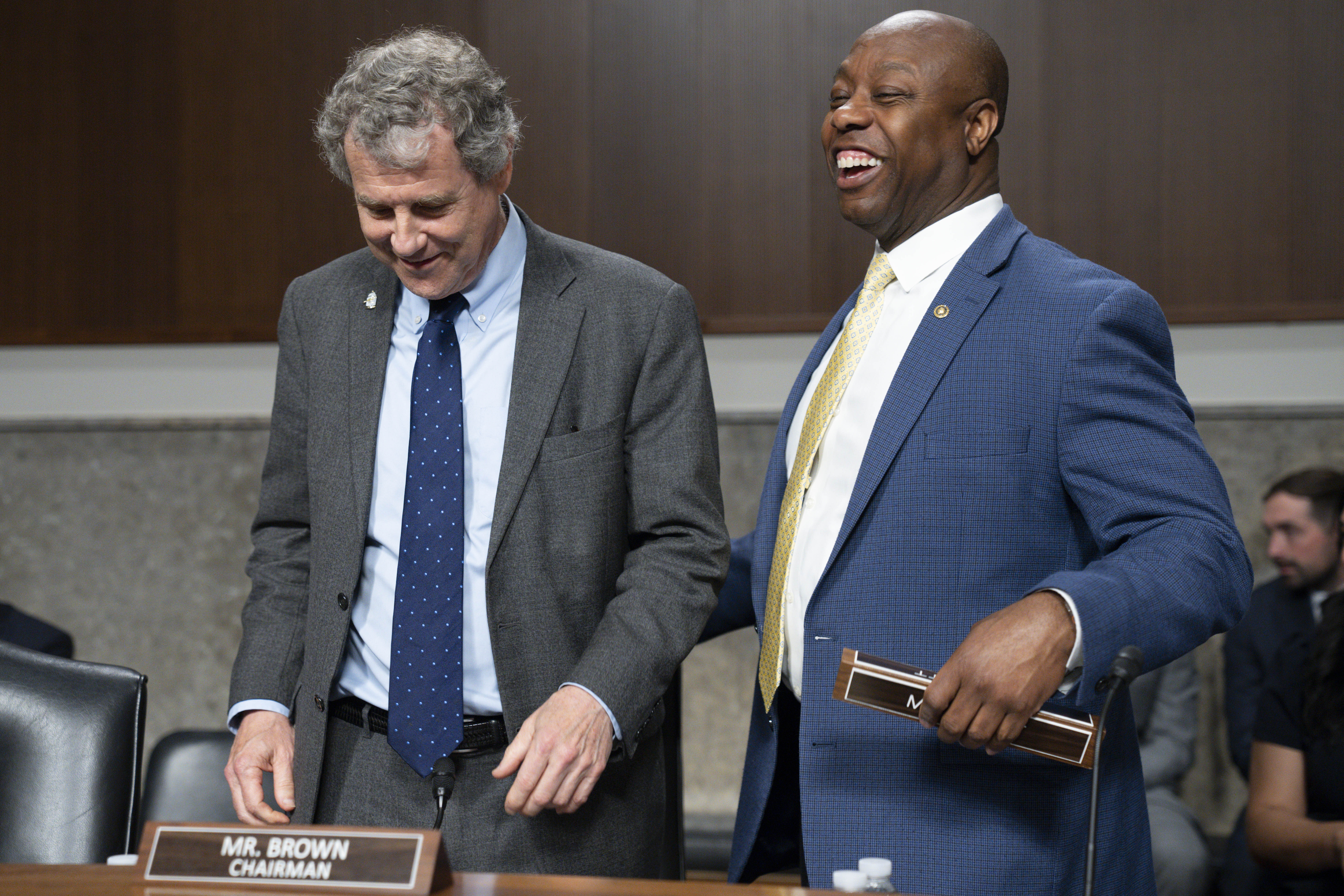Sherrod Brown, Tim Scott float tougher bank CEO penalties after Warren rift
One big question is the extent to which the bill will attract support from Warren and other lawmakers who worked with her to craft an earlier proposal.


Senate Banking Chair Sherrod Brown (D-Ohio) and Sen. Tim Scott (R-S.C.) on Thursday released a plan to crack down on executives at failed banks, amid tensions among other Democrats and Republicans who backed an earlier bill from Sen. Elizabeth Warren (D-Mass.).
The bill by Brown and Scott, the Banking Committee’s top Republican, is Capitol Hill’s most high-profile response yet to the economy-shaking meltdowns of Silicon Valley Bank and other regional lenders. It comes after President Joe Biden called on Congress to impose tougher penalties on senior executives at mismanaged banks that fail.
The bill would empower regulators to claw back certain kinds of compensation from top executives at failed banks — including bonuses and profits from selling stocks — and strengthen regulators' ability to impose penalties on those executives and block them from working in the industry.
The Senate Banking Committee plans to mark up the package — along with another bill helmed by Scott and Brown that would target opioid trafficking — on Wednesday before Congress leaves for its July 4 recess.
One big question is the extent to which the bill will attract support from Warren and other lawmakers who worked with her to craft an earlier proposal that would claw back compensation from executives at failed banks. Warren had drawn support from nearly half the Banking Committee — including key Republicans — and said Wednesday that her plan “represents the toughest proposal in Congress to ensure failed executives who blow up their banks don’t walk off with huge bonuses.”
The Brown-Scott compromise targeting banker compensation is narrower in scope than Warren's.
“I'm just really worried that that's going to get watered down,” Sen. Josh Hawley of Missouri, Warren’s lead Republican co-sponsor, said Thursday before Brown and Scott announced their plan. “If they don't mark it up, maybe I should just go to the floor and try passing it.”
The tensions underscore the thorny political challenge Brown faces as he tries to nail down a compromise that can become law. It requires balancing lawmakers’ appetites for challenging the banking industry — a powerful lobbying force. It also comes at a delicate moment for Brown and Scott, with Brown facing a tough re-election campaign in his increasingly conservative home state of Ohio and Scott in the middle of a bid for the GOP presidential nomination.
The proposal that Brown and Scott released — and will now have to sell to their members — would address concerns that the government is not doing enough to deter and hold accountable bank executives who take excessive risks and expose U.S. taxpayers to potential bank bailouts.
The failures of Silicon Valley Bank and Signature Bank in March led to the U.S. government backstopping all their deposits — the vast majority of which were in excess of the federal deposit insurance backstop. The near-collapse of another bank, First Republic, triggered a $30 billion infusion by the largest U.S. lenders before JPMorgan Chase rescued it in an acquisition.
Brown and Scott’s compromise seeks to address concerns that arose from the recent run of bank failures by empowering regulators to claw back top executives' bonuses and profits from selling stocks, among other forms of compensation. It also includes a so-called good governance provision that allows banks' boards of directors to similarly claw back money — and strengthens regulators' ability to fine executives, as well as to ban executives from the industry.
Like Warren's bill, Brown and Scott's would exclude banks with less than $10 billion in assets. But while Warren's bill stretches back three years, Brown and Scott's only stretches back two. Warren's bill would include a broader range of compensation, including salaries. And Brown and Scott’s bill is permissive — meaning it would clarify regulators’ claw-back abilities, rather than mandate regulators to exercise them like Warren’s does.
"We’ve worked to find a commonsense solution to address executive accountability that is tailored to protect the American taxpayer and limit government overreach," Scott said in a statement.
The March bank failures triggered a flurry of legislation from lawmakers to address the crisis. But the clawback proposal from Warren had recently appeared to be one of the most viable options. She introduced an initial version with Hawley, and then worked with Sen. J.D. Vance — Brown’s Republican counterpart in Ohio — to assemble bipartisan support on the Banking Committee, which Vance serves on.
But Brown chose to go his own way in talks with Scott as he put together a broader legislative package. Brown said in an interview Wednesday: "Warren's bill is narrow; there's several others — and we're taking nothing."
The comments prompted a response from Warren Wednesday.
“Our legislation represents the toughest proposal in Congress to ensure failed executives who blow up their banks don’t walk off with huge bonuses, which is why it enjoys broad bipartisan support from both Democrats and Republicans,” she said in a statement. “Any legislation responding to the recent crisis must build on that consensus and actually deter future wrongdoing by big bank executives by hitting them where it hurts — their wallets.“
Vance said in an interview Thursday that he, Warren, and the rest of their bill's backers “did a lot of the groundwork in terms of solving issues and getting a bipartisan committee on board."
“So I don't know why we wouldn’t just use our bill,” he said.
It’s unclear how other Democrats on the committee will respond to the compromise.
Sen. Bob Menendez of New Jersey, one of the Warren bill’s co-sponsors, said he’d have to ensure the Brown-Scott bill “has the essence” of Warren’s before signing on. Sen. Mark Warner of Virginia, another Warren co-sponsor, said, “I’ll be happy with anything that makes it into the markup.”
“It should not be so difficult to find compromise on the simple principle that when an executive’s wrongful, negligent actions cause the meltdown of a bank that they shouldn't be able to profit from that,” Sen. Chris Van Hollen (D-Md.), a Warren co-sponsor, said in an interview. “That seems like a basic principle.”












